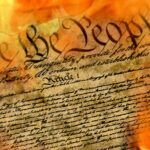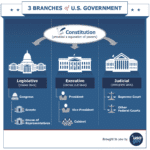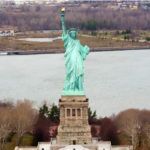Storylines are the backdrop on which today’s headlines play out. They are the historical threads that weave through the political and social battles of the day, alternately driving our aspirations or conspiring to undermine our will to govern ourselves. Whether they are embraced or rejected by prevailing sentiments, the storylines persist as long as we retain faith in the nation’s democratic ideals. It is the ongoing saga of American history that we strive to be better than we are, and that we remember to put our loyalty to the institutions of our democracy ahead of our loyalty to political party or celebrity.
Our human nature requires that democracy be a perpetual work in progress. The push and pull of so many diverging interests often strains the bonds that unite us; the resolve and ingenuity of so many have at times eased tensions and improved our systems and quality of life. That is why it is vital that we all remain informed and engaged shareholders in our American experiment. We are our democracy’s citizen CEOs. Our decisions are the ones that will write tomorrow’s storylines.
 How Authoritarians Took Over the GOP: Donald Trump and Trumpism are the culmination of a decades-long shift in the Republican Party away from the constitutional principles conservatives share with most Americans to the authoritarianism embraced by radicals within the party. It’s been a transformation driven by a strategy that prioritized partisan conflict over collaborative government and courted an angry, fearful populism, aided by a news media that reported, but mostly failed to heed, the warnings from inside the GOP.
How Authoritarians Took Over the GOP: Donald Trump and Trumpism are the culmination of a decades-long shift in the Republican Party away from the constitutional principles conservatives share with most Americans to the authoritarianism embraced by radicals within the party. It’s been a transformation driven by a strategy that prioritized partisan conflict over collaborative government and courted an angry, fearful populism, aided by a news media that reported, but mostly failed to heed, the warnings from inside the GOP.
 Expansion of Voting Rights: The right to vote in America is considered a fundamental democratic liberty – it is one of those rights that we fight wars to defend. Yet, when the nation was founded, voting was almost exclusively reserved for propertied white men. Since then, voting rights have slowly grown more inclusive, expanding to an ever broader cross-section of the American public, but this progress has almost always been hard won.
Expansion of Voting Rights: The right to vote in America is considered a fundamental democratic liberty – it is one of those rights that we fight wars to defend. Yet, when the nation was founded, voting was almost exclusively reserved for propertied white men. Since then, voting rights have slowly grown more inclusive, expanding to an ever broader cross-section of the American public, but this progress has almost always been hard won.
 Growth of Government: The size of the federal government and its role in capital markets have been debated since our independence from Britain was declared. At times, these debates have influenced election campaigns and votes in Congress on policy. The reality on the ground, however, is that the federal government has almost always had a hand in guiding the economy.
Growth of Government: The size of the federal government and its role in capital markets have been debated since our independence from Britain was declared. At times, these debates have influenced election campaigns and votes in Congress on policy. The reality on the ground, however, is that the federal government has almost always had a hand in guiding the economy.
 Law & Politics and the Balance of Power: American democracy relies on a social contract that places a great deal of trust in the checks and balances of the three branches of government, and in a news media often considered a fourth branch. Politics inevitably creeps into this system, especially when circumstances create opportunities for elected officials to take advantage of inadequacies in the Constitution.
Law & Politics and the Balance of Power: American democracy relies on a social contract that places a great deal of trust in the checks and balances of the three branches of government, and in a news media often considered a fourth branch. Politics inevitably creeps into this system, especially when circumstances create opportunities for elected officials to take advantage of inadequacies in the Constitution.
 US Law Indifferent to Immigrants: Immigration policy has paralleled the difficult task of addressing the legacy of slavery in modern American life and the challenges of creating space for Indigenous people whose traditional lands were taken during a period of often-violent expansion. Whereas the law has moved steadily toward greater respect for the rights of Black and Indigenous people, however, it remains more indifferent to the place of immigrants in our society.
US Law Indifferent to Immigrants: Immigration policy has paralleled the difficult task of addressing the legacy of slavery in modern American life and the challenges of creating space for Indigenous people whose traditional lands were taken during a period of often-violent expansion. Whereas the law has moved steadily toward greater respect for the rights of Black and Indigenous people, however, it remains more indifferent to the place of immigrants in our society.
Feature image: Quote at the base of the statue “Future” by Robert Aiken, 1935, National Archives Building, Washington, DC.


